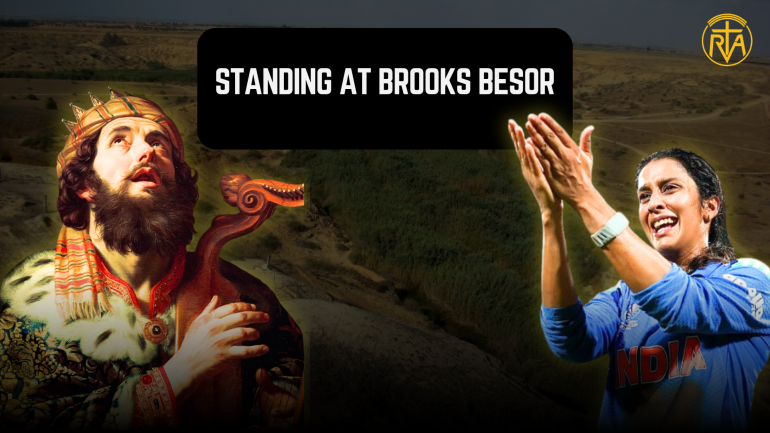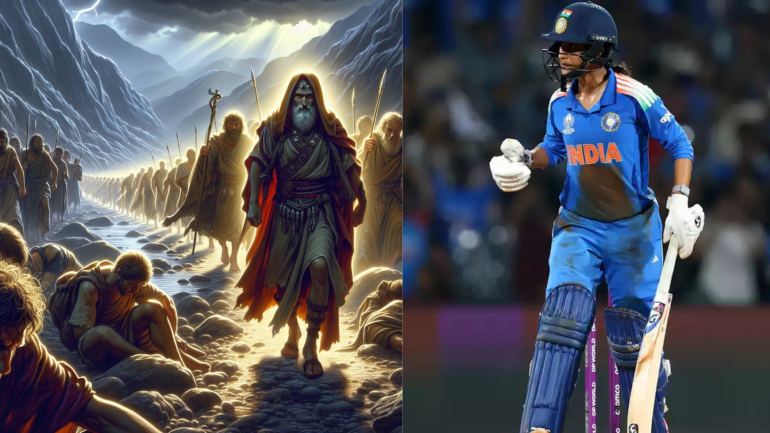Standing at Brooks Besor: David, Jemimah Rodrigues, and Me

“I couldn’t do this, Dad,” I told him. We were in the midst of a difficult project a few years ago, and I just didn’t have the energy to deal with the negative feedback we encountered. I threw in the towel. My Dad absorbed what I said with equanimity and quietly went on to complete the project. This was more than a decade ago, and my Dad is no longer with me. Now, I think of how much he must have been hurt when his only son abandoned him in completing a project they had started together. I wish I could rewrite that moment, but I cannot. Since then, I have also experienced moments of abandonment myself.
I guess this is not unusual. Everyone must have encountered moments like this, moments of dejection, tiredness, and frustration, when those entrusted to you do not want to go further with you but want to give up the journey alongside you, toward the Mission that drives you forward.
What do you do in such a moment? You need to press forward toward the goal, but some of those with you are unwilling to continue.
Looking at the Bible, in 1 Samuel 30, we come across a similar scenario. David and his men returned to Ziklag after meeting the Philistines and found that, in their absence, the Amalekites had burned the town and carried away their women and children.
They were in sorrow and wept. They were so angry that they even wanted to stone David, their leader. David did the right thing and consulted the Lord on what to do next (1 Sam 30:7–9). The Lord strengthened David, and he told his men that they needed to pursue the Amalekites. However, 200 of his men were too tired and wanted to stay behind when they arrived at a place called Brook Besor. These 200 men were too exhausted to cross the brook, even to save their own families. This place exists even today. David then decided to press forward with his remaining 400 men, his team reduced by one-third.
They emerged victorious against the Amalekites and recovered their women and children. On returning to Brook Besor, David insisted that the share of victory be divided equally with the 200 men who stayed behind, saying, “The Lord kept us safe and gave us victory over the raiders; all must get the same share, those who stayed with our supplies and those who went into battle” (1 Sam 30:23–25). David made this a rule, and it has been followed ever since.
I am amazed at the leadership David demonstrated at Brook Besor, where he showed that each member of the team is valuable and equal, even if they are not with us every step of the way. He preserved the dignity of the 200 members who stayed behind, acknowledging that they guarded the supplies.
How many times have I looked down on team members or even family members who did not fully see eye to eye with me or join me in a project? Could I not have understood that they might have just been tired at the time? Could I have been more empathetic, as David was toward the 200 at Brook Besor?

David’s consultation with the Lord in a time of dejection, upon returning to Ziklag, also reminds me that I must turn to Him for guidance in critical moments of leadership, especially when the way forward is unclear.
Quite honestly, this gem of learning might have passed me by had I not read Facing Your Giants by Christian writer Max Lucado. A friend lent me the book as I was preparing for a retreat. The incident is covered in detail there. It reminds me how important it is to read good spiritual books by Christian authors to deepen our understanding of biblical teachings.
Brook Besor's moments teach us that it is all right to rest sometimes from the battle.
Sometimes, like the Indian Catholic female cricketer Jemimah Rodrigues, who propelled her team to the World Cup Final with a historic performance, you stand still, trust your team, and let the Lord fight the battle for you. He will act when and where you cannot.
After all, He has told us, “Let us go off by ourselves to some place where we can be alone, and you can rest for a while” (Mk 6:31).
In 2 Timothy 4:9–18, we see that Paul experienced similar abandonment by friends such as Demas, Crescens, Titus, and others, leaving only Luke with him. He desperately wanted to see his beloved Timothy (2 Tim 1:4). Yet Paul persevered with his Mission despite this abandonment. In 2 Corinthians 12, he speaks of God saying, “My grace is enough for you” (2 Cor 12:9), and recounts the many difficulties he faced, weaknesses, insults, hardships, persecutions, and calamities, yet he continued in his Mission, declaring, “For when I am weak, then I am strong” (2 Cor 12:10).
One day, I might be weary and need to rest with Him, like the 200 did. One day, I might be strong and push ahead like the 400. I will surely face moments in life when some people remain with me for the long haul, while others do not. People who are extremely close to me and know me well. Certainly, moments of abandonment by close ones will hurt, while great moments of victory in a Mission shared with companions will bring exultation.
These two words will help me deal with such moments in equal measure:
Brooks Besor!










Let the whole world be against me but Lord when YOU are with me i have everything.Amen
- Reply
Permalink